THERE WILL BE BLOOD
(2007)
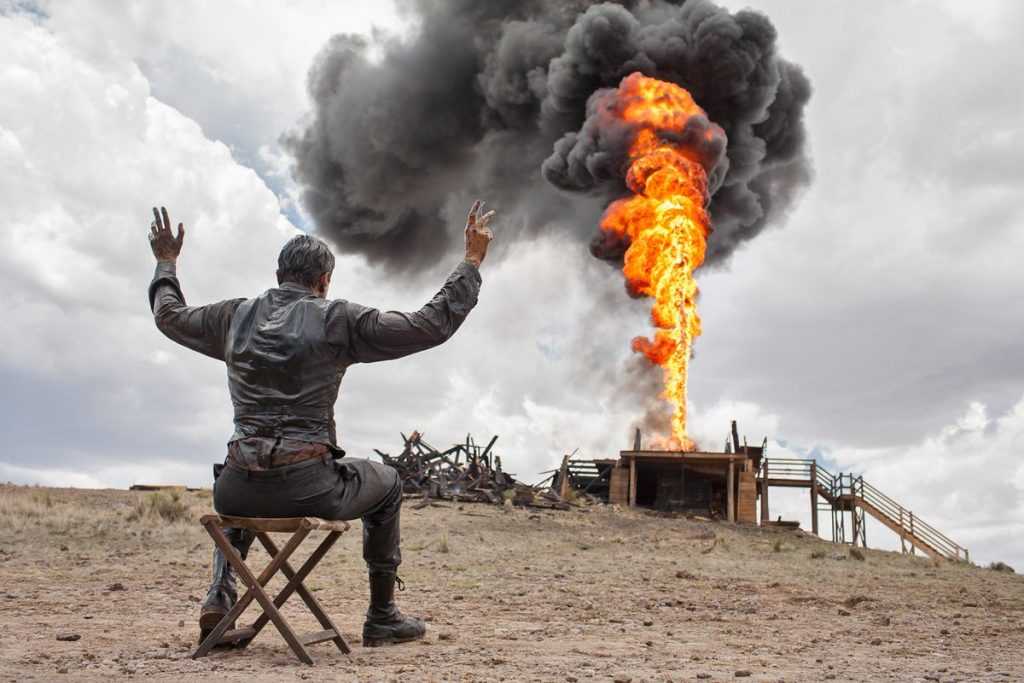
There Will Be Blood (Miramax)
In which Paul Thomas Anderson and Daniel Day-Lewis team up to absolutely drag capitalism. Not only drag it but beat it up, light it on fire, drag it through the mud, and toss it off the side of a bridge, all without breaking a sweat. But despite all the dragging, the real brilliance of it is that they actually have you rooting for capitalism the whole oily way. The mastery of PTA and DDL’s respective crafts coalescing with There Will Be Blood was like the merging of two galaxies in outer space, but instead of it wreaking cosmic havoc to everything in and around them, it produced this enormous, gorgeous swirl of artistry that makes everyone staring up at the stars through a telescope in 2007 how this convergence never existed until then. The relationship works so well because, at least from the view through this telescope, those two knuckleheads are made of the same weird, wicked, black comedy stardust. There Will Be Blood is so close to being in the number one spot on this list. In fact, my arrangement of the top three or four on this list probably changes depending on the day of the week and the state of my mental health. And while this one may not always be in the number one spot of Paul Thomas Anderson’s filmography, it is undoubtedly the best American film of the 21st century.
MVP: It’s hard to pick anyone other than Daniel Day-Lewis (not that he doesn’t deserve it) when his mean, mustachioed mug occupies nearly every frame and sequence of this film. It’s a towering performance that somehow feels forgotten, if ever even heard of (“What’s There Will Be Blood?” “Oh, I think I heard of that.”). For a film with such staggering cinematic enormity, its reach extends so far past the social atmosphere that it feels like an underdog indie that flew under the radar at some film festivals. But DDL’s performance, like the film itself, are the things we’ll remember ten, twenty, fifty years down the line, so long as we have annoying cinephiles like me that grab you by the collar and scream incoherently at you about drinking milkshakes until you simply cannot forget it.
Best Quote: “I have a competition in me. I want no one else to succeed. I hate most people.” —Daniel Plainview (Daniel Day-Lewis)
Best Line Reading(s): Literally everything and anything that Daniel Day-Lewis says. Here are some highlights: •“DRAINAGE…”•“I told you I would eat you up.”•“They should have put you in a glass jar on the mantelpiece.”•“Can I build around fifty miles of Tehachapi mountains? Don’t be thick in front of me, Al.”•“I’m finished!”
Best Scene/Sequence: The best sequence is probably the point at which the movie begins, and then wraps up right as the credits roll.
Magnolia (1999)
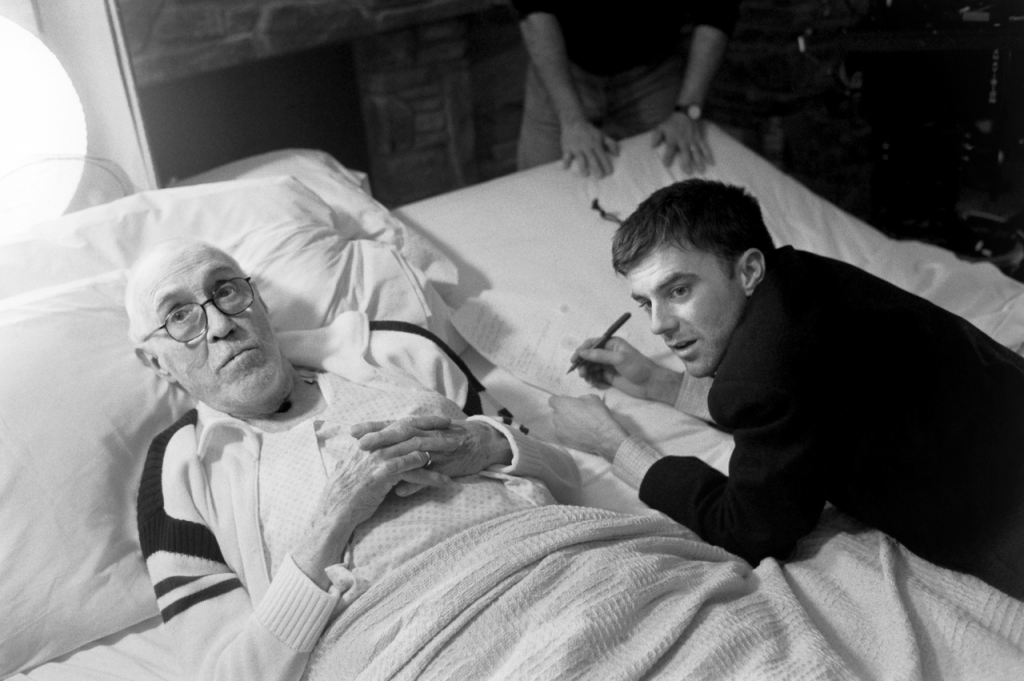
Clocking in at just over three hours long, Magnolia is Anderson’s longest film and also his most introspective. It’s a bit surprising to think that this was only his third feature, especially considering its assuredly grand scale and slice-of-life storyline that sees a multitude of complicated characters come in and out of each other’s lives in ways both big and small over the course of one rainy day in Los Angeles. Magnolia is a film that features so many Anderson trademarks, and one that so unabashedly wears its influence from the likes of Scorsese and Altman on its sleeves, that one may assume this was meant to be the grand finale Anderson would have saved for the end of his already storied career. On the contrary, it’s rather the film that legitimized Anderson as a force to be reckoned with when given free rein in the director’s chair. Featuring what is perhaps the director’s most star-studded and eclectic ensemble cast next to Boogie Nights, it’s the kind of film that represents what was once great about going to the movies and has since begun to fade; few filmmakers are still able to get studios off their backs and swing a major budget for a psychological drama, not to mention one in which action powerhouse Tom Cruise was cast as a seduction coach struggling to come to terms with the scarring emotional damage hidden beneath his misogynistic exterior.
Although Cruise gives what is arguably the best and most dramatically demanding performance of his career, his turn is just the tip of Magnolia’s iceberg, as the film is anchored by some of the rawest performances across Anderson’s entire catalog. The likes of Hoffman, Reilly, Moore, and Melora Walters, among several others, are all in service of Anderson’s symphonic exploration of generational trauma and how the fallibilities of parenthood manifest themselves over several decades. For such serious subject matter, however, Anderson is also sure to inject quite a few moments of off-kilter levity and charm to balance things out, which is more than enough to make Magnolia fly by despite its imposing runtime. Given the equal levels of confidence and indulgence that Anderson demonstrates throughout, there’s a lot of reason to believe that Magnolia is a film that should’ve died on the vine, but it absolutely works. Even if it feels like it never fully taps into the kind of greater meaning it purports to have, it’s hard to resist the chance encounters and twists of fate that provide these troubled individuals with the hope they need to endure the torrential downpour of everyday life, which sets the stage for an uplifting denouement.
Hard Eight (1996)
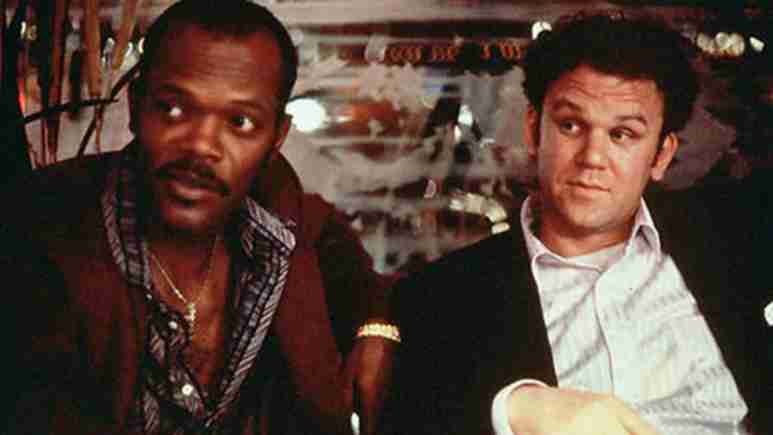 John C. Reilly and Samuel L. Jackson in Hard Eight. Pic credit: Samuel Goldwyn Company
John C. Reilly and Samuel L. Jackson in Hard Eight. Pic credit: Samuel Goldwyn Company
Hard Eight was a movie that showed a talented director on the rise.
In 1996, at the age of 26, Anderson completed his first full-length film and already had a deal in place before he made it thanks to his time in the Sundance Feature Film Program.
Originally titled Sydney, the movie was Hard Eight and had a top-notch cast that included Samuel L. Jackson, John C. Reilly, Gwyneth Paltrow, and Philip Baker Hall. Those actors actually chipped in the money to help him finish it.
In the movie, a professional gambler named Sydney (Philip Baker Hall) teaches a young up-and-comer John (John C. Reilly) the tricks of the trade, which works until John falls for a cocktail waitress (Gwyneth Paltrow).
MAGNOLIA
(1999)
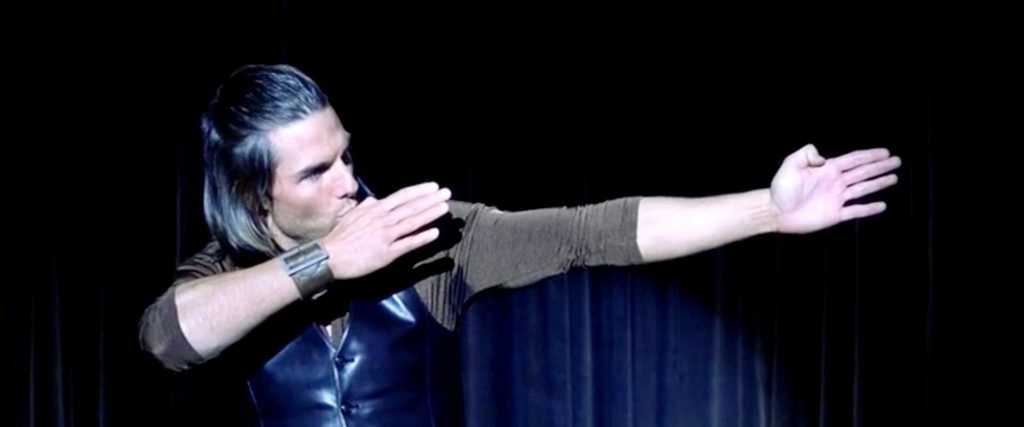
Tom Cruise in Magnolia (New Line Cinema)
After the success of Boogie Nights, Paul Thomas Anderson was basically given carte blanche to do whatever he wanted. What came out of it was not only one of the best and most energetic, eccentric, and entertaining ensemble black dramedies of all time, but a film that forced the viewer to think about their lives and their loves and their existences in ways that no other film has come close to provoking. Magnolia is PTA’s magnum opus, a film that chronicles the both casual and wildly specific interweaving narratives of a group of people in the San Fernando valley across a single day. It’s an epic, psychological study of forgiveness, happiness, misery, happenstance, fate, redemption, and meaning. It’s a film that, as a cautionary tale, challenges the notions of what it means to be alive and how we look at ourselves in the mirror. It’s a film that, as a film, challenges all other films to be anywhere as downright good as it is, in the most unassuming and effortless of ways. While Magnolia may not be his most visually impressive, nor his most crowd-pleasing, nor boast the most accolade-worthy performances, it is, without a doubt, Paul Thomas Anderson’s best film.
MVP: Tom Cruise was never better before and has not been better since his role as Frank T.J. Mackey. Period.
Best Quote: “And I’ll die. Now I’ll die and I’ll tell you what. The biggest regret of my life. I let my love go. What did I do? I’m 65 years old and I’m ashamed. A million years ago. The fucking regret and guilt, these things, don’t ever let anyone ever say yo you you shouldn’t regret anything. Don’t do that. Don’t. You regret what you fucking want. Use that, use that. Use that regret for anything, anyway you want. You can use it, ok? Oh god, this is a long way to go with no punch. A little moral story, I say. Love. Love. Love. This fucking life. Oh.., it’s so fucking hard, so long. Life ain’t short, it’s long. It’s long, goddamn it. God damn… what did I do? What did I do? What did I do? What did I do?” —Earl Partridge (Jason Robards)
Best Line Reading: “I want you to come in with me, and I want you to stay away from me. I want you there in case he needs anything, ‘cause I am not gonna help him. And, Phil? I will dropkick the fucking dogs if they come near me.” —Frank T.J. Mackey (Tom Cruise)
Best Scene/Sequence: The “Wise Up” Aimee Mann pseudo-music video. I think the first time I saw this happen, my jaw was on the floor, like, this is something that’s happening in this movie that I’m watching in real life? It’s one of the many sequences across the film (and the only to specifically connect each ensemble member in a direct, albeit entirely filmic, way) that lifts your heart out of your chest and reminds you that this is what movies can do, and it’s why Paul Thomas Anderson is one of our greatest living filmmakers.
Фильмография
- По дате
- По рейтингу
6.8
Подробная информация о фильме
Драма, Мелодрама
2017
Оператор, Режиссёр, Продюсер, Сценарист
В избранное
Подробная информация о фильме
Комедия, Драма, Криминал
2014
Режиссёр, Продюсер, Сценарист
В избранное
7.0
Подробная информация о фильме
Драма
2012
Режиссёр, Продюсер, Сценарист
В избранное
7.2
Подробная информация о фильме
Драма, Исторический фильм
2007
Режиссёр, Продюсер, Сценарист
В избранное
8.1
Подробная информация о фильме
Боевик, Приключения, Криминал
2002
В ролях
В избранное
6.1
Подробная информация о фильме
Драма
1999
Режиссёр, Продюсер, Сценарист
В избранное
7.9
Подробная информация о фильме
Драма
1997
Режиссёр, Продюсер, Сценарист
В избранное
3. «Нефть» (There Will Be Blood, 2007)
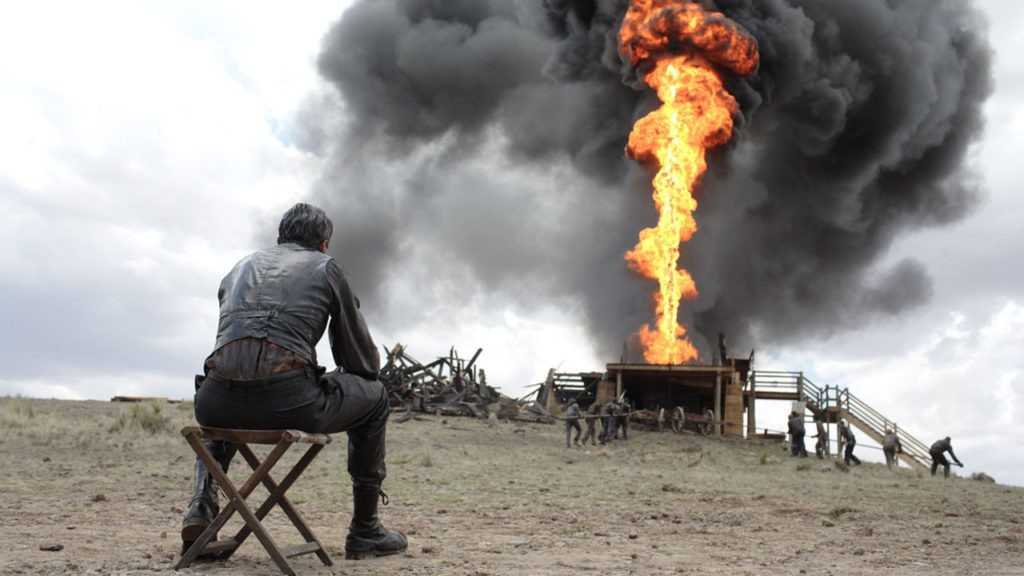 Кадр из фильма «Нефть»
Кадр из фильма «Нефть»
Не будет новостью сказать, что это великий фильм. Если Андерсон – ученик Олтмана, то это его «Маккейб и миссис Миллер», с той разницей, что Маккейб, забытый герой семидесятых, пытался строить бизнес рационально, и эпоха его сломала, а Дэниел Плейнвью (Дэниэл Дэй-Льюис на пике формы) отдаётся капитализму весь без остатка, кривые спроса и предложения складываются для него в крест, нефть заменяет святую воду. В религиозном исступлении от приращения капитала Плейнвью находит, конечно, Бога, но Андерсон не был бы собой, если бы не спросил: какого?
«Нефть» – эпическая, трехчасовая попытка поиска ответа на этот вопрос, безнадёжная, но величественная, в ней можно углядеть учебник по ведению бизнеса, а можно – что-то вроде откровения, и в любом качестве это будет поразительным произведением.
Inherent Vice (2014)
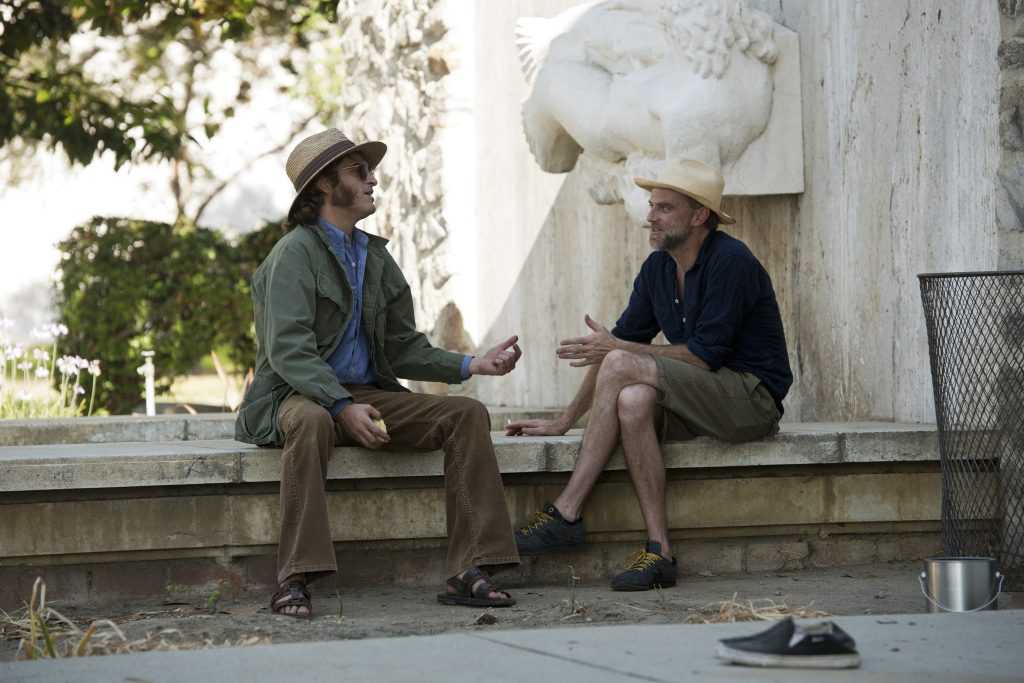
There’s a reason filmmakers have historically been apprehensive to adapt the work of Thomas Pynchon. Master of American postmodernism, the sprawling structure and scope of his novels lends itself almost exclusively to the freedom of the page. But Paul Thomas Anderson isn’t like most filmmakers, and in his euphoric, largely faithful, adaptation of Inherent Vice, he showcases talents in visual storytelling, comedic timing and delivery, and rich characterisations of figures who in the text occasionally slipped into caricature.
Whilst his preceding three pictures seemed to thrive on a subconscious tension created by visuals and score, Inherent Vice is going for something more lilting. Out goes classical music and in comes stoner guitar tracks and Neil Young ballads. Out goes Joaquin Phoenix as Freddie Quell, war veteran, in he comes as spacey private eye Doc Sportello. Despite this, there’s still lots be concerned about in the Los Angeles of 1970: crime, corruption and conspiracy at the highest levels of federal office, as well as the usual ragtag group of opportunist criminals and druggies. Typical of Pynchon, there is a *lot* of plot to handle in Inherent Vice, and its within Anderson’s understanding that the full breadth and scope of it will not be understood on a first viewing without a notepad and pen. In lieu of stationary the film can present itself as a delightful sensory experience, bathed in the sunlight of a bygone era. Anderson has long excelled in period pieces (he hasn’t set a film in the present day since 2002) but never has he recreated an atmosphere and aesthetic so lovingly, with fingerprints of Chinatown and The Long Goodbye visible on the celluloid, melding with the original author’s eye for eccentric detail within the largest of canvases.
Upon the movie’s release in 2014, for every critic swooning over the film there were three more bewildered and frustrated by its surplus of plot (yet lack of a story) and indulgent runtime. Rather than being inserted into the canon, like The Master or There Will Be Blood, Inherent Vice seems destined for cult classic status, the underrated gem in a filmography accepted with loving arms by fans eager to revisit its hysterical (in both senses) hysterical genius.
7 Licorice Pizza (2021) — 3,9
В настоящее время идет в кинотеатрах.
Если есть две вещи что Андерсон любит больше всего на свете, это долина Сан-Фернандо и 70-е годы, так как многие его фильмы основаны на одном из них. И совсем недавно выпущенный фильм Пицца с лакрицей включает в себя и то, и другое, что делает его самым типичным фильмом PTA, но это ни в коем случае не означает, что он плохой.
На самом деле, даже несмотря на то, что он вышел не так давно, зрители были настолько очарованы фильмом, что многие называют его лучшим фильмом Андерсона за последние годы. Справедливости ради следует отметить, что между невероятным актерским составом второго плана, в который входят Шон Пенн и Брэдли Купер, и его проработанными персонажами есть аргумент, что Пицца с лакрицей — это самый лучший фильм Пола Томаса Андерсона.
The Master
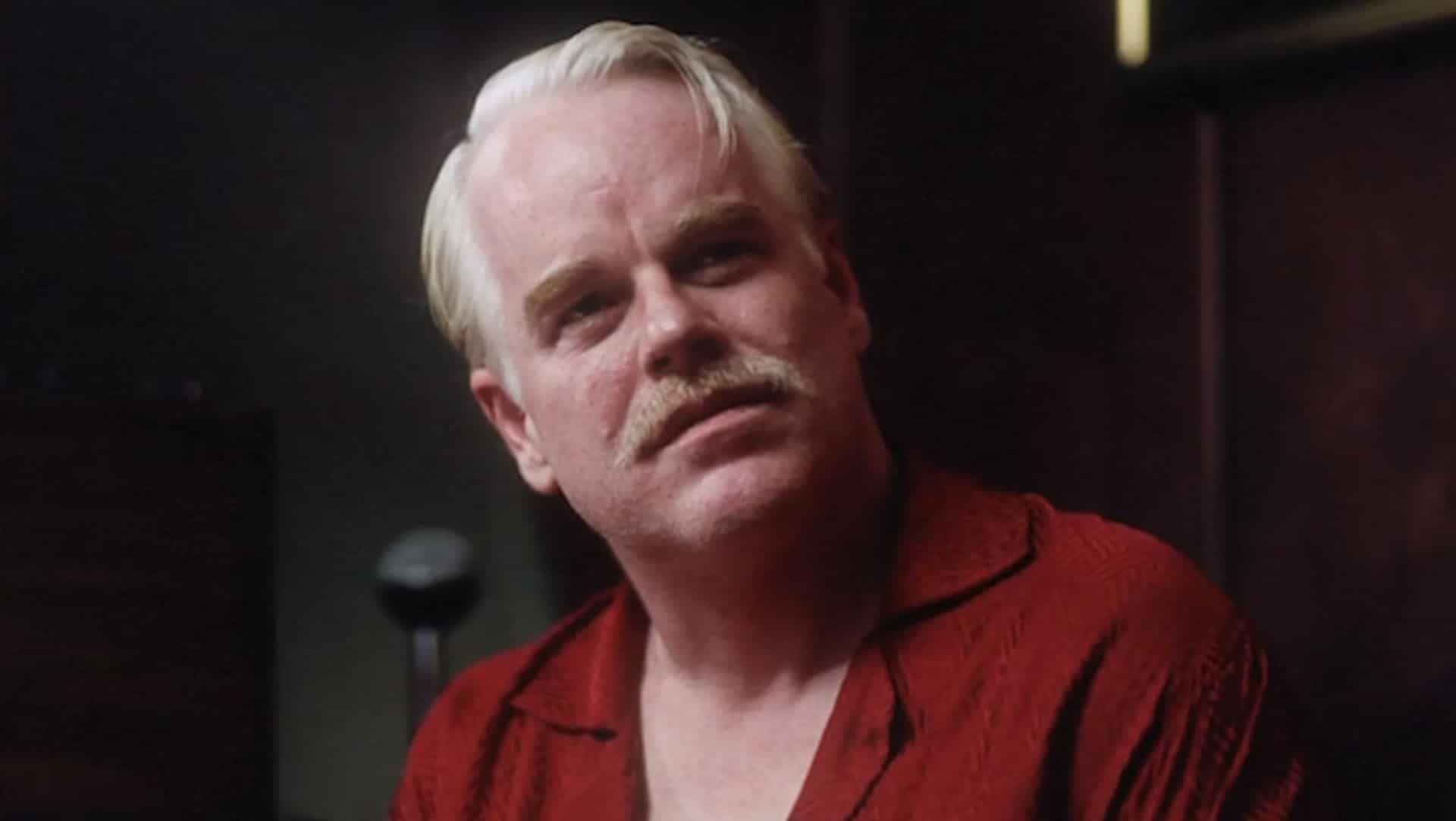
Courtesy of Annapurna Pictures.
Anderson had taken on ensemble-heavy projects with Boogie Nights and Magnolia, and had managed to then turn towards more singular character-driven stories with Punch-Drunk Love and There Will Be Blood, both to extreme success.
For his next project, Anderson tackled another introspective character study of a flawed individual, but this time, rather than focusing on one character, he attempted to analyze two very different people who are paradoxically drawn to each other.
The Master focuses on an unstable, aimless drifter, Freddie Quell (Joaquin Phoenix), who is recruited into a Scientology-esque religious group led by its charismatic leader, Lancaster Dodd (Philip Seymour Hoffman). As Freddie grapples with his own troubled past, he attempts to integrate himself into the group, forming a somewhat tumultuous relationship with Dodd, who may not altogether be the enlightened thinker he makes himself out to be.
A wild ride of a movie, The Master blends Anderson’s archetypical main character—an outsider unable to find happiness or connection with society—and the role religion plays in securing an individual’s happiness or fulfillment.
Easily, the movie’s strongest point is the chemistry and onscreen relationship between Phoenix and Hoffman, two brilliant actors who manage to feed off each other’s energy (similar to how their characters feed off each other in the movie—Quell looking for direction and fulfillment, Dodd looking for someone his religion can fundamentally change). They both deliver outstanding performances—although that’s not meant to take anything away from the amazing script, cinematography, or direction.
Фильмы Пола Томаса Андерсона
С самого момента своего выхода, «Врожденный порок» считался паршивой овцой в перечне работ ПТА, случайная осечка в безупречном, за ее вычетом, послужном списке. Пренебрежительное безразличие, с которым был встречен этот фильм, во многом связано с тенью двух глыб, фундаментальных психологических исследований, которые ему предшествовали: «Нефти» и «Мастера».
«Врожденный порок» — это почти дословно пересказанный сюжет романа Томаса Пинчона, что делает этот фильм первой честной экранизацией в карьере Андерсона.
Название последнего фильма Андерсона прозрачно намекает на опьяняющие, но едва ли очень гладкие отношения между двумя его основными персонажами. Влечение между парнем в пубертатном возрасте и женщины двадцати с чем-то лет обычно вызывает некоторые вопросы, но история рассматривает эту спонтанную связь — от сопровождения в поездке до делового партнерства — как странную протянутую между ними нить, рожденную не плотским желанием (не взаимным, по крайней мере), а эмоциональной созависимостью.
Сводить такое эклектичное и тематически богатое произведение, как вот этот фильм Андерсона, к одному простому мотиву, значит быть полным слепцом. Тем не менее, есть архетип персонажа, который появляется в его работах чаще, чем любой другой — это суррогатный отец.
«Восьмерке» не хватает многого, но и по сей день фильм остается своеобразным микрокосмом стиля ПТА, где заявлены все его визуальные фишки.
Из всех редких качеств, которыми обладает Андерсон, определяющим для него, пожалуй, является его диапазон. В то время как большинство его современников не отходят от разработанных ими привычных тропов и знакомых ритмов повествования, ПТА построил свою карьеру на постоянном переизобретении себя же.
Хотя эта камерная андерсоновская драма вышла не менее пронзительной и волнующей, чем другие его фильмы, она все же выбивается из ряда вон, как минимум в формальном аспекте.
О достоинствах Андерсона как сценариста что-то да говорит деталь, что из внушительного списка мужских протагонистов, куда входят и жадные нефтяные магнаты, и морально истерзанные ветераны войны, и порнозвёзды с наркотической зависимостью, наиболее цельный — продавец вантузов. Адам Сэндлер в своей, думается, лучшей роли в карьере, играет Барри Игана, забитого интроверта, который скрывает терзающих его демонов под маской внешнего спокойствия. Главный герой через многое проходит в этом фильме, и иногда наблюдать за его наплевательским отношением к себе становится даже тяжеловато.
Если внимательнее присмотреться к коллекции эмоционально сломленных персонажей ПТА, у них можно обнаружить много общих черт. Одинокие, сбившиеся с дороги, эти душевные калеки находятся в состоянии постоянного душевного раздрая. Это относится к Фредди Куэллу, бесприютному алкоголику, ветерану Второй мировой, который по стечению обстоятельств встречает Ланкастера Додда, харизматичного лидера со склонностью как к высокопарным спичам, так и к пустым обещаниям. «Мастер» целиком полагается на текучую динамику между этими двумя разительно отличающимися мужчинами.
«Ночи в стиле буги» — это классическая история взлёта и падения на материале порноиндустрии 70-х, расказывающая о превращении Эдди Адамса из посудомойщика в ночном клубе в популярную порнозвезду. Фильм открыто заявляет об источниках своего вдохновения, отсылая к калейдоскопическу нарративу Роберта Олтмена и эмоциональной операторской работе Мартина Скорсесзе.
https://youtube.com/watch?v=W8f1kijkdcY
Пятый полнометражный фильм Андерсона рассказывает о Дэниеле Плэйнвью (Дэниел Дэй-Льюис в своей лучшей роли), который на рубеже веков путешествует по калифорнийской пустыне со своим приёмным сыном в поисках нефти, денег и власти. Его превращение в безжалостного магната призвано донести старую как мир мысль: жадность и эгоизм — корень всех зол. Но «Нефть» представляет собой настоящую американскую трагедию, нестареющую классику.
Набив руку на «Ночах в стиле буги», Пол Томас Андерсон решил в следующем проекте показать решительно всё, на что способен. И в этом смысле «Магнолия» — фильм с избытком. Это оперная симфония, пронизанная всей помпезностью и самомнением молодого режиссера, который не может уже дождаться, чтобы показать всем и каждому свое уникальное видение.
8 Hard Eight (1996) — 3,6
Доступно для потоковой передачи на Kanopy или для аренды на Amazon Prime Video.
Сложно Восемьне только недооценивают, но и упускают из виду, поскольку даже многие поклонники режиссера не видели фильм. Релиз 1996 года — режиссерский дебют Андерсона, но он похож на работу режиссера, работающего в киноиндустрии десятилетиями. Он настолько хорошо сделан, что кажется, что каждый кадр обдумывался часами.
Однако, что интересно, это, безусловно, самый узкий по сюжету фильм в фильмографии режиссера. В то время как в большинстве его фильмов актерский состав состоит из нескольких сюжетных арок, Hard Eightследует за наемным убийцей на пенсии, работающим в игровых автоматах в казино, который принимает бездомного. Он сильно отличается от других фильмов Андерсона, и хотя в нем участвуют все его постоянные соавторы, в том числе Филип Бейкер Холл и Джон С. Рейли, он еще не выработал свой собственный стиль. Криминальный триллер очень напоминает криминальные фильмы 80-х.
LICORICE PIZZA
(2021)
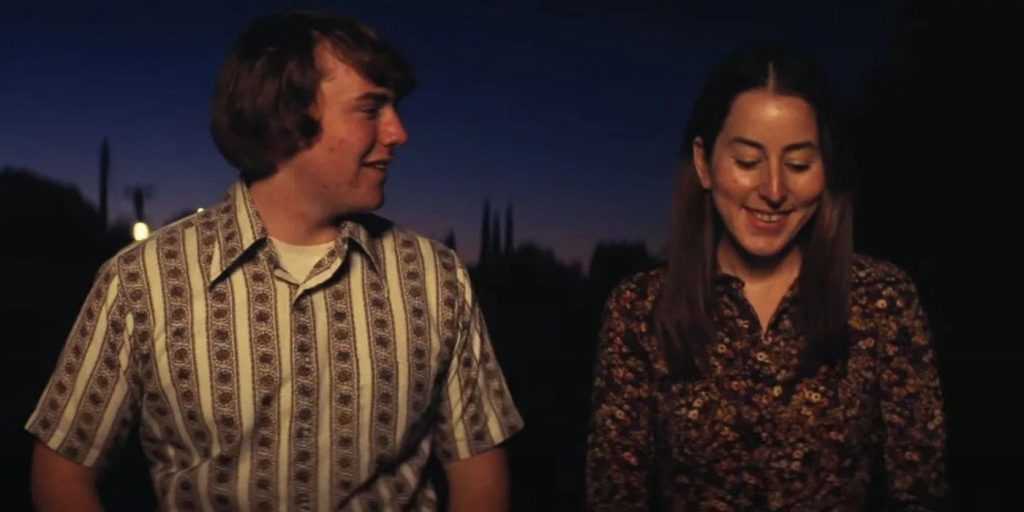
Cooper Hoffman and Alana Haim in Licorice Pizza (Focus Features)
PTA drifts back toward ensemble territory (something we’ve not seen from him since Magnolia) in a small way with this year’s Licorice Pizza, a 70s coming of age story that’s so damn good it feels impossible not to have existed for as long as it did. It feels reductive to bill it as a story of a cheeky entrepreneur child actor in the San Fernando valley and his relationship with this older woman that would love nothing more than to clock the living daylights out of every man that looks sideways at her, because the film– and the experience of seeing it– is so much more. Featuring some sure-to-be-iconic supporting turns from the likes of Bradley Cooper, Sean Penn, Tom Waits, and Benny Safdie, and lead by two home-run performances from Cooper Hoffman and Alana Haim that are made even more incredible by the fact that both of them are making their film debuts, Licorice Pizza is the kind of movie that may go under appreciated now, but this is the kind of flick that your dad will call you about in twenty years because he’s watching it on TNT at one in the morning and he can’t believe he’s never seen before. And, as if that weren’t all enough, it’s a rare reminder of the correct way to use a kick-ass soundtrack not just as an underscore, but as a way to tell and propel the story.
MVP: Harriet Sansom Harris’ scene-stealing bit role in Phantom Thread earned her another spot on the Paul Thomas Anderson all-star lineup, this time as a Hollywood agent in a single scene, during which she eats up every word of dialogue like a delicious, succulent ham as if it was the last meal she’d ever have.
Best Quote: “I’m not going to forget you. Just like you’re not going to forget me.” —Gary Valentine (Cooper Hoffman)
Best Line Reading: Anything that comes out of Bradley Cooper’s mouth, but especially: “My only problem in life is that I love tail too much. I love it. I love it so much. I love it so much… I love it so much, it’s gonna kill me one day.” —John Peters (Bradley Cooper)
Best Blink-And-You-Miss-It Line: “Yes, I’m the real Herman Munster.” —Herman Munster (John C. Reilly)
The Master (2012)
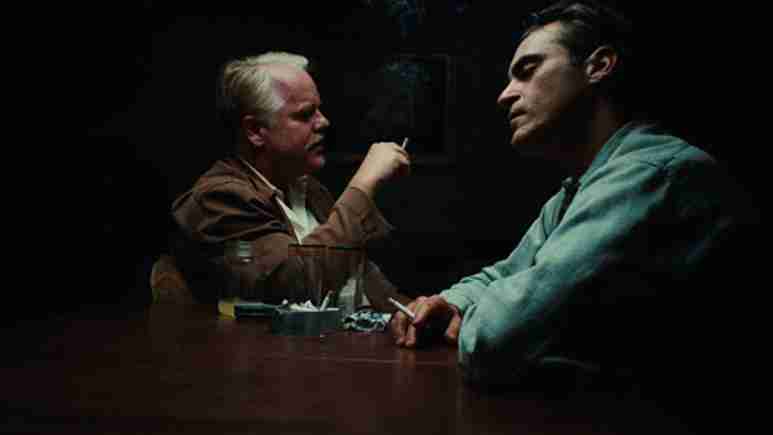 Joaquin Phoenix and Philip Seymour Hoffman in The Master. Pic credit: The Weinstein Company
Joaquin Phoenix and Philip Seymour Hoffman in The Master. Pic credit: The Weinstein Company
Released in 2012, The Master was a massive undertaking by PT Anderson and one that was polarizing with audiences.
The movie was shot as a giant epic, with Anderson using cameras and releasing it, where possible, in a 70mm film print.
It looked glorious and was truly a masterful film from the visual standpoint. The acting is also top of the line, with Philip Seymour Hoffman and Joaquin Phoenix leading the way. However, what pulls it down is the story itself.
Phoenix is Freddie Quell, a World War II veteran trying to find his place in the world. He meets Lancaster Dodd (Hoffman), the leader of a religious movement who offers him a new life. The religious movement is said to loosely represent Scientology.
The Master was named to several Best Of lists for the year and picked up three Oscar nominations, all for acting (Hoffman, Phoenix, and Amy Adams).































